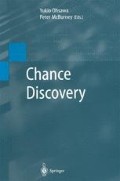Summary
This chapter shows how to derive postsemantic context based on vector representations of words (described in Chap.8). The core problem is to discover relevant word associations in relation to seed words in the utterance. This may involve uncovering implicit associations or reweighting explicit associations more highly. The set of such associations forms a part of ‘conversational implicature’. The chapter describes techniques for computing associations in a dimensional space that have shown promise in the literature. The goal is to provide some initial insights as to their usefulness for mining conversational implicature by applying them to a small set of email utterances.
Access this chapter
Tax calculation will be finalised at checkout
Purchases are for personal use only
Preview
Unable to display preview. Download preview PDF.
References
Barwise J, Seligman J (1997) Information flow: the logic of distributed systems, Cambridge University Press, Cambridge
Freyd J (1983) “Shareability: the social psychology of epistemology”, Cognitive Science, 7: 191210
Grice P (1989) Studies in the way of words. Harvard University Press, Cambridge, MA
Gärdenfors P (2000) Conceptual Spaces: the Geometry of Thought MIT Press. London, UK
Landauer TK, Foltz PW, Laham D (1998) An introduction to latent semantic analysis, in Discourse Processes, 25: 259–284
Lund K, Burgess C (1996) Producing high-dimensional semantic spaces from lexical co-occurrence in Behavior Research Methods, Instruments & Computers,28(2):203208
McArthur R, Bruza PD (2001) The ABCs of Online Community, in Web Intelligence: Research and Development, LNAI 2198, Springer Verlag, Heidelberg, Germany, pp. 141–147
McGuiness DL (2002) Ontologies Come of Age. In: Fensel D. et al (eds) Spinning the Semantic Web: Bringing the World Wide Web to Its Full Potential, MIT Press, Cambridge, MA
Perry J (1997) Indexicals and demonstratives, In: Hales B, Wright C (eds) A companion to the philosophy of language, Blackwell, Oxford, UK, pp. 593–595
Perry J (1998) Indexicals, contexts, and unarticulated constituents, In Computing Natural Language, CSLI Lecture Note No.81, pp. 1–11, CSLI Publications (Stanford, CA )
Song D and Bruza PD (2001) Discovering information flow using a high dimensional conceptual space, in Proceedings of the 24 th Annual International ACM SIGIR Conference, pp. 327–333
Song D, Bruza PD (2002) “Towards a theory of context sensitive information inference”, accepted for publication in Journal of the American Society for Information Science and Technology, pp.326–339
Author information
Authors and Affiliations
Editor information
Editors and Affiliations
Rights and permissions
Copyright information
© 2003 Springer-Verlag Berlin Heidelberg
About this chapter
Cite this chapter
McArthur, R., Bruza, P. (2003). Discovery of Tacit Knowledge and Topical Ebbs and Flows Within the Utterances of an Online Community. In: Ohsawa, Y., McBurney, P. (eds) Chance Discovery. Advanced Information Processing. Springer, Berlin, Heidelberg. https://doi.org/10.1007/978-3-662-06230-2_9
Download citation
DOI: https://doi.org/10.1007/978-3-662-06230-2_9
Publisher Name: Springer, Berlin, Heidelberg
Print ISBN: 978-3-642-05609-3
Online ISBN: 978-3-662-06230-2
eBook Packages: Springer Book Archive

